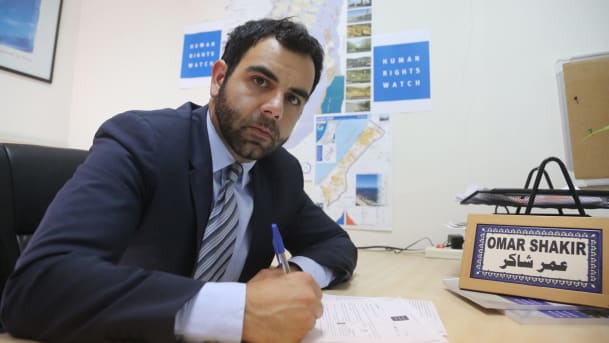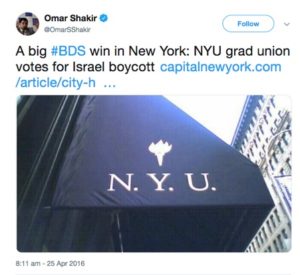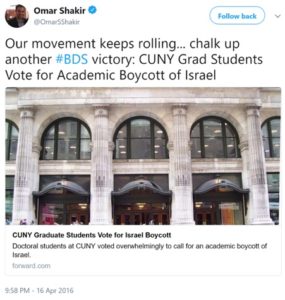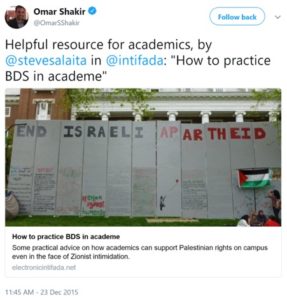FRESH AIR
ABC gives BDS-supporting Human Rights Watch activist a huge free kick
November 11, 2019 | Allon Lee

Human Rights Watch (HRW) has long had skin in the anti-Israel game and that’s not just AIJAC saying it.
In 2009, HRW’s founding father Robert Bernstein sternly rebuked the organisation he established in 1978.
Bernstein said HRW had “lost critical perspective on a conflict in which Israel has been repeatedly attacked by Hamas and Hezbollah, organizations that go after Israeli citizens and use their own people as human shields”, issuing “far more condemnations of Israel for violations of international law than of any other country in the region” and “helping those who wish to turn Israel into a pariah state”.
HRW, Bernstein explained, was founded to monitor states that are not “open, democratic societies” with “the ability to correct” faults and abuses.
Israel he wrote is “home to at least 80 human rights organizations, a vibrant free press, a democratically elected government, a judiciary that frequently rules against the government, a politically active academia, multiple political parties and, judging by the amount of news coverage, probably more journalists per capita than any other country in the world — many of whom are there expressly to cover the Israeli-Palestinian conflict” and clearly does not need HRW’s obsessive scrutiny.
Last week, Israel’s Supreme Court upheld an Interior Ministry decision not to renew the work visa of HRW’s representative in Israel and the Palestinian territories, Omar Shakir.
The Court agreed that Shakir had breached a 2017 law barring entry to foreigners who promote the BDS (Boycott, Sanctions and Divestment) campaign against Israel and Israeli settlements and gave him 20 days to leave the country.
HRW as an organisation was not expelled from Israel, and has other activists there – Shakir was simply denied a renewal of his visa.
This was the lead story on ABC Radio National’s “Breakfast” program last Thursday (Nov. 7).
“Breakfast” chose to cover the story solely through a one-on-one interview with Shakir, without including any genuine alternate voice to articulate the case against him.
The interview’s nine-and-a-half minutes became a vehicle for HRW’s narrative that Israel is trying to silence human rights advocates and has joined the ranks of human rights abusers like Egypt and Syria.
What are the ABC’s standards?
This analysis is not necessarily a defence of Israel’s 2017 law nor Shakir’s deportation. It is however a critique of some very poor and one-sided ABC journalism.
It is concerned with whether the report met the ABC’s professional standards as set out in its own Code of Practice:
4.3 Do not state or imply that any perspective is the editorial opinion of the ABC. The ABC takes no editorial stance other than its commitment to fundamental democratic principles including the rule of law, freedom of speech and religion, parliamentary democracy and equality of opportunity.
4.4 Do not misrepresent any perspective.
4.5 Do not unduly favour one perspective over another.
The report ignored large amounts of clear evidence, easily accessible from numerous online sources, of Shakir’s long history of pro-BDS activism. It also failed to identify BDS’s goals, which as articulated by founder Omar Barghouti demands an unlimited right of Palestinians to move to Israel, refuses to back a two-state solution and in essence calls for Israel’s replacement by a majority Arab state.
Host Hamish Macdonald mostly lobbed a series of Dorothy Dixers, letting Shakir himself summarise the case against him, so he could dismiss it.
Moreover, despite the wealth of evidence available, none of which was presented, Shakir blatantly denied backing BDS, and was completely unchallenged in this claim.
When Macdonald straight out asked Shakir “so, what is your position on the boycott movement against Israel?”, the activist prevaricated:
“Human Rights Watch has never and nor I as its representative call for boycotts of Israel. We’ve never called for a consumer boycott of those companies much less of Israel proper.”
This is contradicted by the extensive online paper trail cataloguing Shakir’s BDS advocacy and promotion of a one-state solution which runs like an unbroken thread from his student days through to his day-to-day activities at HRW.
The history of Shakir’s BDS support and anti-Israel activism
In April 2016, six months before joining HRW, Shakir Tweeted:


From January 2016:

In December 2015, Shakir Tweeted:

The Israeli organisation NGO Monitor has detailed a plethora of Shakir’s BDS and anti-Israel activities dating back a decade:
-
- In 2010-2013, Shakir attended Stanford University Law School. In April 2011, he lectured at an event at Stanford titled “Renewing the Call for Divestment: A Campaign to Divest from Companies that Profit from Human Rights Violations in Israel/Palestine.”
- In 2012, Shakir participated in the “Divestment Launch” at Stanford at an event titled “Students Confronting Apartheid in Israel.” The event also featured Fadi Quran, a senior campaigner at Avaaz, Policy Member for Al-Shabaka, and former UN Advocacy Officer with Al-Haq.
- In 2013, as founder and co-president of Stanford Students for Palestinian Equal Rights (SPER), Shakir introduced a BDS bill calling for the Board of Trustees to “reevaluate University investments in several companies, including Riwal, Motorola, Ahava, Caterpillar, Lockheed Martin, Veolia Transport, Mekorot Water Company and Cement Roadstone Holdings” as they “violate human rights and international law.”
An NGO Monitor factsheet shows Shakir’s BDS activities and public statements since joining HRW in October 2016:
-
- Shakir has spearheaded numerous campaigns, including calling for BDS against companies with business activity over the 1949 Armistice line, pressing FIFA to sanction the Israel Football Association, promoting the UN BDS database (blacklist), and demonizing Israeli responses to violence along the Gaza border.
- In March 2017, (shortly after he received his Israeli work visa) Shakir traveled to Bahrain to “press FIFA” to sanction the Israel Football Association. (He was refused entry.)
- In September 2017 and May 2018, HRW published reports targeting Israeli banks and calling on “institutional investors” to divest from Israeli banks.
- Shakir led a two-year long coordinated and well-financed BDS campaign targeting Airbnb (and Booking.com), including the November 2018 publication “Bed and Breakfast on Stolen Land: Tourist Rental Listings in West Bank Settlements.” The report contains numerous false claims regarding the legal and human rights responsibility of Airbnb in allowing Israelis from the West Bank to list their properties. Airbnb initially acquiesced to the pressure and announced it would remove Jewish listings in the West Bank, but reversed its decision in April 2019 after settling numerous lawsuits for discrimination filed against the company.
- Shakir has advocated for the UN BDS database, a blacklist of businesses that operate across the 1949 Armistice line. The campaign uniquely targets Israel, is aimed at economically damaging companies that are owned by Jews or do business with Israel, and is ultimately meant to harm the Jewish State. In July 2018, Shakir tweeted, “Today at Human Rights Council, @hrwcalled for…supporting UN database of settlement businesses.”
- In June 2018, Shakir called for BDS against Israel, stating that it was “Time for targeted sanctions against those implicated in serious abuses”.
Whilst Macdonald did ask if HRW reports are “an important ingredient for those who do then wish to pursue these Israeli boycotts”, he let Shakir repeat his absurd claim that “while we take no position for or against, it is a tactic that’s been used across the world to advocate for change.”
Despite the abundance of smoking guns, Macdonald did not cite one example of Shakir’s BDS activity.
No questions asked
Instead, Macdonald steered the remaining six minutes of the interview towards HRW’s preferred comfort zone of denouncing Israel’s claims “to be the region’s only democracy”.
Descending into hyperbole, Shakir called his imminent deportation “the lowest moment in Israel’s modern history when it comes to the kind of assault on human rights advocates.”
He denounced the Court, saying it puts a “stamp on the government’s clampdown on human rights advocacy” and verballed the judgment of Israel’s fiercely independent Supreme Court, claiming that it “said that human rights advocacy constitutes a call for boycott and is grounds for deportation”.
In fact, the Court agreed BDS is a grave threat to Israel and found that Shakir does supports BDS in breach of the 2017 law.
Tellingly, the judgment on Shakir cited a past case regarding Israel’s attempt to deny a visa to US citizen Lara Alqasem in 2018 to study at Jerusalem’s Hebrew University on the grounds she had advocated BDS.
In 2018, the Court overruled denying Alqasem a visa in part because she recanted her past BDS support, which Shakir refuses to do. As last week’s judgment explained:
Shakir refused to make a statement similar to [Lara] Alqasem’s, in light of his current occupation, and the way he conducts himself, it can be said, that [Shakir] is still operating in the grey area of the boycott districts – in a manner which does not allow negating the fear of him abusing his stay in Israel.
Shakir was not asked by Macdonald why he didn’t adopt Alqasem’s approach, especially if, as he claims, he doesn’t support BDS in his capacity as an HRW representative.
But by this stage, not only had Shakir’s BDS activism been buried but Macdonald chimed in with his own digs at Israel.
Macdonald and Shakir furiously agree
Macdonald said “an observation I would make having travelled there and worked there myself is that it has always been quite difficult for journalists. Particularly they want to know where you’re from, what you’re doing, the kinds of stories you’re doing. I mean Israel is a democracy. It does say that it upholds freedom of speech but there is a different view of criticism in Israel compared with other democratic open societies.”
Of course, despite MacDonald’s claim about the “difficulty” of covering Israel as a journalist, Israel actually has virtually the highest per capita presence of foreign journalists in the world – so it is obviously not that hard. Meanwhile, Israel is arguably the world’s only liberal democracy that has spent every day of its existence trying to balance a commitment to those lofty principles whilst confronting enemies who are hell-bent on its destruction. BDS is merely a more subtle and pernicious manifestation of this goal.
ABC ignored HRW report critical of Hamas and Fatah
Interestingly enough Shakir tried to establish his bona fides by citing a landmark report he worked on into Hamas and Fatah’s abuse of their own people’s human rights over the last 25 years. Indeed, an important document – but before we get too carried away, one that NGO Monitor said failed “to identify the most severe and unjust cases of Hamas and PA arrests and torture”.
It is worth noting that upon the release of that HRW report in October 2018, the ABC completely failed to cover it. Yet, here in this insistence, suddenly HRW is promoted to the top story of the day, and given a huge slice of unchallenged airtime in a prime news slot for its anti-Israel narrative.
Shakir’s protestations that HRW “use[s] the same tactics on Israel we do every other country” and he is merely an impartial HRW employee doing his job in detailing Israel’s alleged human rights abuses is belied by his decade long record of extremist activism predating his appointment.
It is apparent that Human Rights Watch appointed a well-known anti-Israel activist because they wanted someone who could be relied upon to continue to bring that same approach to its Israel reporting.
It doesn’t take a sleuth to uncover and then marshal the evidence that would determine whether Shakir is an active BDS supporter – as impartial courts in which Shakir was judged and fully represented have repeatedly found.
In covering this issue and giving it the prominence that it has, the ABC opted for surface gloss, and evidently prioritised other imperatives over satisfying the basic journalistic standards of balance, fairness and pursuing the truth it is required to achieve under its editorial guidelines.
Tags: Anti-Zionism, Israel, Media/ Academia, NGOs, Palestinians
RELATED ARTICLES

Enormous hope that Iran is being liberated: Colin Rubenstein on Sky News

He survived Bondi. Now he’s fighting back: Arsen Ostrovsky addresses AIPAC conference





















